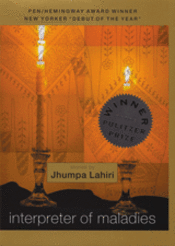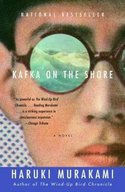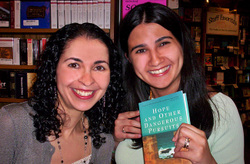
by Natasha Tynes | Dec 8, 2006 | Books
Very few books manage to put a smile on my face these days. I really do not know what’s happening to me but the number of books that I hate is far larger than the ones that I like.
Dancing Arabs, however, is one that I’m absolutely falling in love with. I’m already halfway through, and so far, not a single chapter has managed to disappoint me. The story, originally written in Hebrew by Arab-Israeli author Sayed Kashua, is a tale about the tiresome hunt for somewhere to belong.
It sheds light on the lives of Arab-Israelis and their constant struggle to determine their identity. The book portrays the life of the protagonist as someone living on the periphery, in limbo. He is stuck in two worlds, miserably failing to belong to either one. The writing style is absolutely gripping but whimsical and very comical at times.
Here is an excerpt:
I look more Israeli than the average Israeli. I’m always pleased when Jews tell me this. “You don’t look like an Arab at all,” they say. Some people claim it’s a racist thing to say, but I’ve always taken it as a compliment, a sign of success. That’s what I’ve always wanted to be, after all: a Jew. I’ve worked hard at it, and I’ve finally pulled it off.
One paragraph that I personally identified with is this one:
The Arab newspapers wrote a story about a goat that could say “Sadaa – aa- aam.” Then people began seeing Saddam’s face in the moon. When I came home, my father couldn’t believe I didn’t see it myself. He took me outdoors and tried for hours to explain where I should look: where the nose was, where the mouth was, where the mustache was, and the beret. In the end, I did see him. It really did look like him. Not just like him — It was him. Look straight up.
I was almost thirteen when the first Gulf War took place. Back then, Jordanians were cheering for Saddam. All my classmates were seeing Saddam’s face on the moon. They used to come to school telling stories of their visions from the night before. One night, I grabbed my ten-year-old sister by the hand and told her that tonight was the night, that we had to do our best to see Saddam after our earlier failed attempts.
We walked to the end of our bedroom and looked out from the window at the dark blue, starless sky. We could see the moon clearly. It was a full one that night. We stared and stared. I squinted hard until I saw the mouth, the eyes, and even the mustache.
“Look, I see him. Saddam is on the moon. Do you see him now?” I asked my sister.
“I do,” she said before dragging herself back to bed.
Author Laila Lalami hails this book on her blog. Here is a link to her review of the book. She concluded her review with the following statement:
Dancing Arabs is a difficult book for both Arabs and Jews to read–neither group is shown in a particularly good light, and, no doubt, people on either side will be angered by the mirror that the writer holds up– yet Kashua’s unsparing account is a necessary read for both.
Do read this book if you get the chance. It is a treat.
by Natasha Tynes | Nov 11, 2006 | Books

While I was on the phone the other day with my very good friend Mariam, the subject of our current reading lists came up. I was surprised to find that Mariam was reading Jhumpa Lahiri’s The Interpreter of Maladies. It’s a collection of short stories that I finished a couple of weeks ago and haven’t stopped thinking about since. We both agreed that these stories, which shed light on the lives of Indian immigrants in the US, are just beautiful in every sense of the word. Each tale is a masterpiece. Lahiri raises various issues such as integration, arranged marriages, detachment from home and marital complexities. It is no surprise that this collection of stunning tales clinched the Pulitzer Prize.
Lahiri’s stories avoid cliché, as they draw what I perceived as a realistic picture of the lives of first and second generation Indian immigrants. One thing I liked was the way Lahiri presented the issue of arranged marriages, which is quiet common in Indian society. In one of her tales, an arranged marriage was doomed to failure from the beginning. While in another, an arranged marriage worked beautifully, as the couples involved fell in love shortly after they tied the knot. In this manner, Lahiri has succeeded in presenting a balanced portrayal of preplanned nuptials.
I could go on forever about how much I enjoyed this book but I won’t. I would simply say that it was one of the best books I have read in a very long time. It is simply a treat.
by Natasha Tynes | Oct 15, 2006 | Books, Jordan, my nation
Diala Khasawneh writes in The Jordan Times about book censorship in Jordan, recounting a story that happened to her years ago when she was traveling with her mother across the borders from Beirut to Amman:
The original officer, his superior and a couple of curious men were now hovering around our car. We were being questioned about these books. Telling them the box had several books, some on art others on psychology, was not sufficient. They wanted to look through the box, see every single book. I had to tell them the title, a brief of the content and leaf through each one, by the third book my mother had lost it. “I am a professor, a teacher, I have material to teach students, a university, academia, research, knowledge …. She, my daughter, is a student, at school, reading, studying… What do you expect us to have in the car?…. What do you expect us to own?”
Books were simply not an easy item to smuggle through to Jordan. To be honest, we knew that. We had anticipated it, but still, the truth is, we are continuously shocked by it. I always hide books I bring back home from travel. I always distribute the music CDs in my suitcase and very carefully wrap the films. I am always worried they will be confiscated for censorship. Although there is a “procedure,” but in most cases one never sees these items again. Books are the drugs of Jordan.
A similar incident happened to me some years ago when I tried to ship my books from London to Amman. I went to Queen Alia Airport one month after my arrival in Amman to pick up about three boxes of books. Of course, I had to go through the censorship department, which consisted of one man in an office. The man, who had a cigarette dangling from his lip, flipped through the pages of every book I had packed into my boxes. I had to explain to “the inspector” that I was a student and that these were academic books I bought when I was studying in London. This did not convince him. He continued flipping through the books, which were mostly about media and journalism. I guess he found them somehow threatening. I waited patiently until he realized that I was not trying to smuggle anything that might endanger our society. Fortunately, that day, I was allowed to reclaim my books.
So while the jaded thirty-year-old in me blogs about book censorship in Jordan, there is a young motivated Jordanian who blogs about ways to encourage Jordanians to read. The jaded part of me somehow finds it easier to identify with Diala, who says:
Today in Jordan, the censorship institution destroys the books confiscated. They are all collected and regularly destroyed. Piles and piles of words and images, of histories and fiction, of truths and lies condemned with capital punishment. Books are the witches of today. Burnt to death at the stake. The books burn to ashes. The books are burning towards our death. We are at a standstill. The world moves on. We are sinking in the quick sand of ignorance. Our rivers are pitch black. We do not remember their original color and are too afraid to imagine.
… than with Lina who wants to start a campaign to encourage people to read. The jaded part of me believes that we first need to examine the root cause behind the mediocre number of readers in Jordan. I say let’s start with abolishing the censorship department. In this day and time — where anything can be accessed with no sweat — this department is simply a waste of space. Hat tip: [Euroarabe]
by Natasha Tynes | Oct 8, 2006 | Books
 I recently finished reading Yasmin Khadra’s The Attack, a novel revolving around the Palestinian-Israeli conflict. The story is about Amin, an Arab-Israeli surgeon who is well-assimilated into Israeli society. He discovers — to his utter surprise — that his wife has blown herself up in a crowded restaurant inside Israel. Flabbergasted and devastated by her actions, Amin embarks on a journey of discovery in an attempt to understand the reasons behind his wife’s unexpected actions.
I recently finished reading Yasmin Khadra’s The Attack, a novel revolving around the Palestinian-Israeli conflict. The story is about Amin, an Arab-Israeli surgeon who is well-assimilated into Israeli society. He discovers — to his utter surprise — that his wife has blown herself up in a crowded restaurant inside Israel. Flabbergasted and devastated by her actions, Amin embarks on a journey of discovery in an attempt to understand the reasons behind his wife’s unexpected actions.
Khadra, whose real name is Mohammed Moulessehoul, does not take sides. Instead, he does quite a good job in presenting both sides of the bloody conflict. Written in the first person, human emotions are what drives this story. The narrator’s internal struggle is well presented and skillfully written. I highly recommend this book, especially to those that are seeking a better understanding of the Israeli-Palestinian conflict. Here is a blurb from the New Yorker’s review:
Dr. Amin Jaafari, an Israeli Arab, seems fully assimilated into Tel Aviv society, with a loving wife, a successful career as a surgeon, and numerous Jewish friends. But after a restaurant bombing kills nineteen people, and it becomes apparent that his wife was the bomber, he plunges into the world of Islamic extremism, trying to understand how he missed signs of her intentions. Khadra (the nom de plume of Mohammed Moulessehoul) vividly captures Jaafari’s anguish and his anger at the fanatics who recruited his wife. The Israelis don’t escape lightly, either, as their army marches over law-abiding Arab citizens in an attempt to stamp out the militants. Khadra’s writing has a tendency toward cliché, but the book’s dark vision of the conflict is powerful.
by Natasha Tynes | Sep 19, 2006 | Books
 While vacationing in Myrtle Beach, I managed to finish Haruki Murakami’s Kafaka on the Shore, a lengthy novel that I had been carrying around for over a month. This was my first book by Murakami. It was actually the first time I’ve ever read anything by a Japanese author. The novel had a unique style (at least to me). It played and reminded me a bit of Akira Kurosawa’s Dreams, where reality blended with mysticism. There were parts in the novel where leeches dropped from the sky and others where characters spoke with cats. Some bits really engaged me while others failed to attract me making the novel a bit of a drag.
While vacationing in Myrtle Beach, I managed to finish Haruki Murakami’s Kafaka on the Shore, a lengthy novel that I had been carrying around for over a month. This was my first book by Murakami. It was actually the first time I’ve ever read anything by a Japanese author. The novel had a unique style (at least to me). It played and reminded me a bit of Akira Kurosawa’s Dreams, where reality blended with mysticism. There were parts in the novel where leeches dropped from the sky and others where characters spoke with cats. Some bits really engaged me while others failed to attract me making the novel a bit of a drag.
A reviewer on Amazon.com described the novel as the last ten minutes of Magnolia. What an accurate description! I had the same thought while I was in the middle of the novel. One thing I noticed about Murakami’s style is that he is a great creator of characters. I managed to empathize with each of his characters, even his darkest character, who he christened "Johnny Walker." Yes, like the whiskey!
One character that really intrigued me was Colonel Sanders, the founder of Kentucky Fried Chicken. Murakami brought him to life in this novel, although he doesn’t represent himself but rather plays the role of a floating soul who has adopted the physical appearance of Colonel Sanders. For anyone looking for a bit of off-beat reading, this is your book.
by Natasha Tynes | Jun 17, 2006 | Books, Metro Daze, Shutterbug, Weblogs
 I had the opportunity to meet Moroccan author Laila Lalami face-to-face the other day in Washington, and I must say that she is extremely admirable and more impressive in the flesh than in cyberspace. She was in Washington, DC this past Thursday to read some excerpts from her debut novel, Hope and Other Dangerous Pursuits (signed copies link), which I read several months back and liked very much. I enjoyed her reading immensely as I did the discussions that followed. Lalami eloquently managed to answer every question directed at her, the majority of which came from euroarabe.
I had the opportunity to meet Moroccan author Laila Lalami face-to-face the other day in Washington, and I must say that she is extremely admirable and more impressive in the flesh than in cyberspace. She was in Washington, DC this past Thursday to read some excerpts from her debut novel, Hope and Other Dangerous Pursuits (signed copies link), which I read several months back and liked very much. I enjoyed her reading immensely as I did the discussions that followed. Lalami eloquently managed to answer every question directed at her, the majority of which came from euroarabe.
One question someone asked was who she has in mind as her audience when she writes. Her reply was simply: "I write for myself. I am my ideal audience." I thought the answer was brilliant because as an aspiring fiction writer myself I tend to fall into the trap of thinking a great deal about my audience, something that can sometimes make me feel mentally impotent. I end up failing to jot down anything for fear of retribution from a certain individual or a group. I think I will try her method and think solely of myself when I write.
It was also fascinating for me to see the large amount of her blog readers who showed up at the event. She got a great deal of praise for her blog from the audience with one describing her site as "the best literary blog out there." Following the reading, I had a quick but pleasant chat with Laila in which we exchanged compliments and pleasantries and took a couple of pictures. The husband and I wrapped up the evening with a nice dinner in DuPont Circle with some wonderful friends, including Basboos, Leilouta and her husband, euroarabe, and another non-blogger friend of ours. All in all it was a perfect day in the city.





